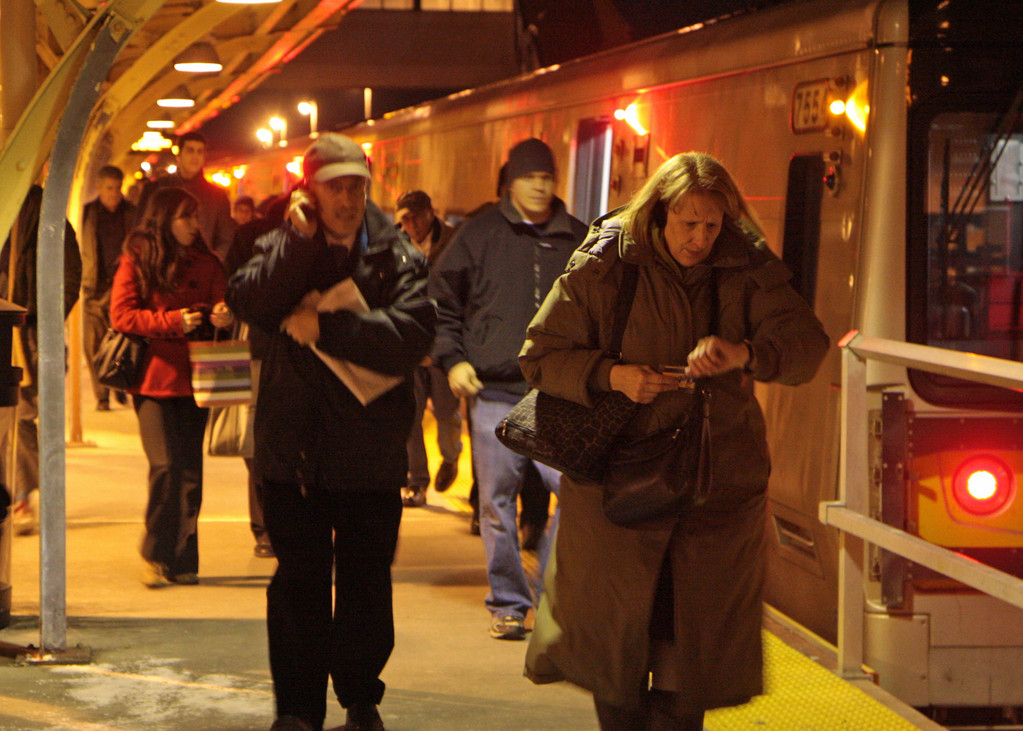Commuters grapple with LIRR fare hikes
As MTA deals with budget woes, passengers say they’re shouldering the burden
Long Beach resident Jessica Levitt takes the Long Island Rail Road to Penn Station each day, then rides the subway downtown to her job at a brokerage firm. Levitt said that when she started her job nearly four years ago, her monthly train ticket cost about $200.
As she waited for her train on Jan. 3, however, Levitt had seen the cost of that ticket increase most recently by 7.6 percent, and she said she now pays $299, which includes $45 for a MetroCard. The increase, she said, has had a tremendous impact on her daily budget.
“I knew there was going to be a hike, but it’s not like my salary is increasing,” she said. “I’ve already made myself cut back on certain things — I make sure I make my own lunch and I bring my own coffee — but it definitely has caused a change in my outlook.”
Levitt and many other commuters say that the latest fare increase is just too much to bear, especially just days after LIRR service finally returned to normal following the post-Christmas blizzard, which created widespread train delays.
“It’s not like the service is getting better,” she said. “It’s unfortunate because it’s really expensive. A lot of people are upset about it — it’s not something that’s easy to deal with. I wouldn’t mind paying more for better service, but they cut trains all the time.”
Commuters were hit with the hikes on Dec. 30, after the Metropolitan Transportation Authority’s board approved them in October, part of a series of fare policy changes the agency made to help close a $900 million budget gap. The price of most commuter rail tickets rose between 7.6 percent and 9.4 percent, depending on the type of ticket and the length of the route. MetroCard prices, bridge and tunnel tolls and bus fares also increased.
The LIRR is the largest commuter railroad in the country, with an average weekday ridership of nearly 290,000. Long Beach commuters like Levitt say that the $254 cost of a monthly ticket has only added to the metropolitan area’s already high cost of living.
“Just yesterday I bought my monthly ticket — it’s crazy,” said former Long Beach resident Richard Schurin, an attorney who takes the LIRR from Island Park to work in Midtown, where he is a partner in a law firm. “I don’t know how they expect people to continue to make a living.”
Schurin said that recent service disruptions have seemed to be more frequent on the Long Beach line. “It doesn’t help to have the fares raised, and the service is questionable,” he said. “The Long Beach line, especially, seems like it’s the most affected whenever something happens.”
The latest fare increase is expected to raise $421 million this year to help close the MTA’s budget gap, and with the agency’s financial resources clearly stressed, MTA officials say they will identify additional actions to address future deficits. Another 7.5 percent increase in fares and tolls is planned for 2013. According to the MTA, a $470 million increase in pension costs has dramatically reduced projected cash balances and increased projected deficits.
Long Beach resident Richie Boodman said he blames the agency’s budget woes on its high pensions and salaries.
“It’s bad enough that taxes in Long Beach are excessive,” Boodman said. “You add the cost of a commute and it makes Long Island a place where young people aren’t going to move to because they can’t afford it. The MTA’s high salaries and pensions are just not sustainable.”
Other commuters said that they now think twice about what were once habitual purchases. “You don’t always buy that expensive cup of coffee or lunch now,” said Long Beach resident Rachel Sherer, 30, who works at an eyewear company in Midtown. “You see more people bringing their lunch and thermoses — we’re definitely budgeting.”
Sherer, who takes a Long Beach city bus to the LIRR station, adds that $30 monthly cost to her train fare, for a monthly total of $284. “It’s a lot of money for a system that’s not always reliable,” she said. “It’s funny how the railroads were out of service for almost two days during the blizzard — just days before they announce that the fare hike was about to take place.”
Comments about this story? Arifilato@liherald.com or (516) 569-4000 ext. 213.






